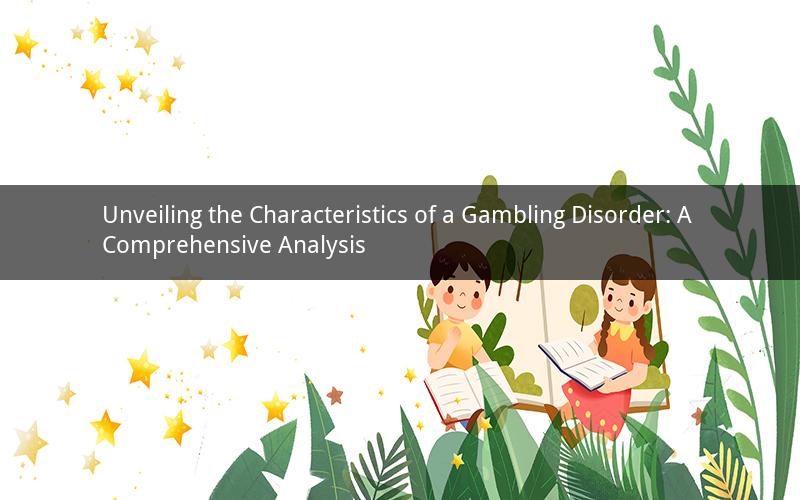
Introduction:
Gambling disorder, also known as problem gambling or compulsive gambling, is a serious condition that affects individuals of all ages, backgrounds, and socioeconomic statuses. It is characterized by an uncontrollable urge to gamble, despite the negative consequences it may have on one's life. This article aims to explore the key characteristics of a gambling disorder, shedding light on its signs, symptoms, and potential impact on individuals and society.
1. Uncontrollable Urge to Gamble:
One of the defining characteristics of a gambling disorder is the overwhelming and irresistible urge to gamble. This compulsion can manifest in various forms, such as a constant preoccupation with gambling thoughts, the need to increase the stakes to achieve the same level of excitement, and the inability to control the frequency and duration of gambling activities.
2. Neglecting Responsibilities:
Individuals with a gambling disorder often find themselves neglecting their responsibilities due to their gambling habits. This may include failing to meet work or school obligations, neglecting family and personal relationships, and ignoring financial responsibilities. The obsession with gambling can take precedence over all other aspects of life, leading to significant disruptions and negative consequences.
3. Financial Consequences:
Gambling disorder can have severe financial implications. Individuals with this condition may experience a constant need to chase losses, leading them to borrow money, sell possessions, or engage in illegal activities to fund their gambling habits. The consequences of financial distress can be devastating, resulting in debt, bankruptcy, and even homelessness.
4. Emotional and Psychological Impact:
Gambling disorder can have a profound emotional and psychological impact on individuals. Those affected may experience intense feelings of guilt, shame, and depression as a result of their gambling behavior. The constant need to gamble and the subsequent failure to meet expectations can lead to feelings of frustration, anxiety, and isolation. In some cases, individuals may develop co-occurring mental health disorders, such as substance abuse or depression.
5. Relationship Damage:
Gambling disorder can strain and ultimately damage relationships with family, friends, and loved ones. The secrecy, lies, and deceit often associated with this condition can lead to trust issues and emotional turmoil. Relationships may suffer as individuals with a gambling disorder prioritize their gambling habits over their loved ones, causing emotional pain and distance.
6. Legal and Social Consequences:
The consequences of a gambling disorder can extend beyond the individual, affecting the broader community. Individuals with this condition may engage in illegal activities to fund their gambling, such as fraud or theft. Additionally, the financial burden of gambling debt can lead to social instability, including eviction, loss of employment, and even involvement in criminal activities.
7. Physical Health Implications:
Gambling disorder can also have physical health implications. The stress and anxiety associated with this condition can lead to various physical symptoms, such as headaches, insomnia, and gastrointestinal problems. In some cases, individuals may experience increased heart rate and blood pressure, potentially leading to cardiovascular issues.
Frequently Asked Questions:
1. How can I determine if I or someone I know has a gambling disorder?
You can assess the presence of a gambling disorder by examining the following signs: an uncontrollable urge to gamble, neglecting responsibilities, financial consequences, emotional and psychological impact, relationship damage, legal and social consequences, and physical health implications.
2. Is gambling disorder a mental health disorder?
Yes, gambling disorder is classified as a mental health disorder in the Diagnostic and Statistical Manual of Mental Disorders (DSM-5). It is recognized as an addictive behavior that requires appropriate treatment and support.
3. Can a gambling disorder be treated?
Yes, gambling disorder can be treated through various methods, including therapy, counseling, support groups, and medication. Seeking professional help is crucial for individuals struggling with this condition.
4. How can I support someone with a gambling disorder?
Supporting someone with a gambling disorder involves understanding their struggles, offering empathy and compassion, encouraging them to seek professional help, and providing a safe and supportive environment. It is essential to approach the situation with patience and understanding.
5. Can a gambling disorder be prevented?
While it is not possible to completely prevent gambling disorder, certain measures can be taken to reduce the risk. These include promoting responsible gambling practices, educating individuals about the potential risks of gambling, and fostering a supportive environment that discourages excessive gambling behavior.
Conclusion:
Understanding the characteristics of a gambling disorder is crucial for recognizing its impact on individuals and society. By identifying the signs and symptoms, seeking professional help, and providing support, we can address this pressing issue and help those affected lead healthier, more fulfilling lives.